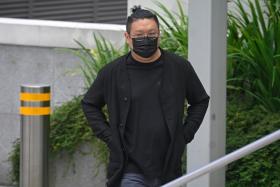Two arrested in raid of suspected drug lab in Yishun
December raid first suspected case of drug manufacturing here in recent years
Officers burst into an illegal drug lab and arrested suspects before a team in HazMat (Hazardous Materials) suits moves in.
That might seem like something out of a movie, but it happened here on Dec 6, in what is believed to be the first suspected case of drug manufacturing in Singapore in recent years.
The Central Narcotics Bureau raid, supported by the Singapore Civil Defence Force and Health Sciences Authority, ended with two men, aged 40 and 45, being arrested. The authorities also seized 2.6kg of synthetic cannabis and 500g of an "unknown powdery substance".
A CNB spokesman told The Straits Times that there have been no drug manufacturing cases here in "recent years".
If convicted of unauthorised manufacturing of a Class A controlled drug, the two men each face at least 10 years' jail and five strokes of the cane.
When ST visited the industrial unit where the drugs were believed to have be made, neighbours said they hardly interacted with the employees there.
A sign on the door indicated that the unit housed a ship supplies company. The management of the industrial building on Yishun Industrial Street 1 declined to comment, and attempts to contact the unit's owner went unanswered.
Mr Wu Jia Wei, 30, a partner of a cleaning company next to the unit, was shocked to discover what had allegedly been going on just next door. "There was no strange smell, no unusual noises, it was very quiet."
Lawyer Amarick Gill, who has been practising for 20 years, said: "(Drug) cases are usually possession, consumption, trafficking or importation of drugs. I've never come across a case of manufacturing before."
Typically, drugs are made in other countries and traffickers or abusers are caught when they try to bring them into Singapore, said Mr Gill.
"Tuas and Woodlands Checkpoints are the usual points where drugs are intercepted before they reach our shores. Traffickers or abusers are also caught during spot checks or when the authorities act on tip-offs," he added.
Synthetic cannabis, also known as synthetic cannabinoids, is classified as a new psychoactive substance (NPS) and is a Class A controlled drug.
It is sometimes referred to as "spice" or "K2" and is often packaged as dried plant material laced with fragrances and spiked with a synthetic cannabinoid.
While its molecular structure differs from the active molecule in the cannabis plant, synthetic cannabis acts on the same receptors in the brain for a similar effect, said Dr Too Heng Phon, an associate professor at the National University of Singapore's Biochemistry department.
Prof Stella Quah, adjunct professor at Duke-NUS Medical School, noted that addicts elsewhere have tried manufacturing illegal drugs, although such activity is difficult to hide in Singapore.
There is a threat that thesehomemade drugs can be manufactured here because of the availability of information online, she noted.
"Drug users might be deceived into thinking that it is easy to do so.
"The dangers of 'cooking drugs' at home and consuming them range from the serious risks of handling volatile chemicals without protective gear and equipment, to injecting or consuming cheap, non-purified hazardous substances."
Get The New Paper on your phone with the free TNP app. Download from the Apple App Store or Google Play Store now


